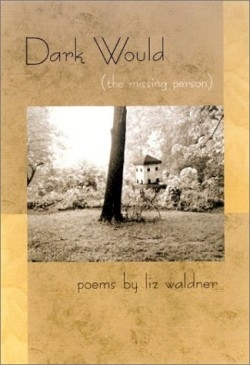It looks like you've stumbled upon a page meant to be read by our code instead of viewed directly. You're probably looking for this page.
Dark Would (the missing person)
Dante’s words from Purgatorio open this volume: “Mid-way this life’s journey, I came to myself in a dark wood?” This wood, under devious machinations, becomes the Dark Would of the title, a search for self and divinity through lexical recrafting and postmodern poetics. Although each of the book’s sections begins with the words of men (Galileo, Aristotle, Dante), the book feels decidedly gendered, linking itself with modernist poet H.D. and her attempts to create a female poetics and female divinity. Waldner acknowledges this debt early in the book, referencing H.D.’s Trilogy and playing with homonyms, parentheticals, and etymology in ways that are powerfully reminiscent of that senior poet.
Winner of the University of Georgia Contemporary Poetry Series Competition, Waldner takes the quest a step further, integrating humor into her chaotic world of sexually ambiguous relationships, French phrases, and religious and classical references. In “Portrait of Self as Potted Plant,” the poet toys with the traditional notion of self-portrait and gender politics. The poem in its entirety reads: “Bless’d beyond compare / except potted.” Fate based on biology keeps returning. In “Role-Call,” the poet fights the invisibility of being motherless; denying what is “natural”: “I’m all shadow. / Bird song bleeds out of me as substance / therefore. I go / away.”
An unfulfilled biological fate defines the narrator in society. However, the poet escapes this fate through writing. She asserts from the beginning that writing will save her, that stone tablets remain and words possess a preternatural life expectancy. By reconstructing the language, line, syntax, and sense of those who came before, this poet creates a new sort of intensely personal poetics.
Readers should be prepared for a challenge. The oral tradition finds itself secondary to visual puns and parenthetical asides; in the creation of something new, Waldner requires absolute attention to the most fleeting of details: a cut heel, peaches, Alice in Wonderland. She leaves precious few clues with which to concoct meaning, and perhaps that is her intent, to challenge the ways in which poetry is read and constructed.
Disclosure: This article is not an endorsement, but a review. The publisher of this book provided free copies of the book to have their book reviewed by a professional reviewer. No fee was paid by the publisher for this review. Foreword Reviews only recommends books that we love. Foreword Magazine, Inc. is disclosing this in accordance with the Federal Trade Commission’s 16 CFR, Part 255.
